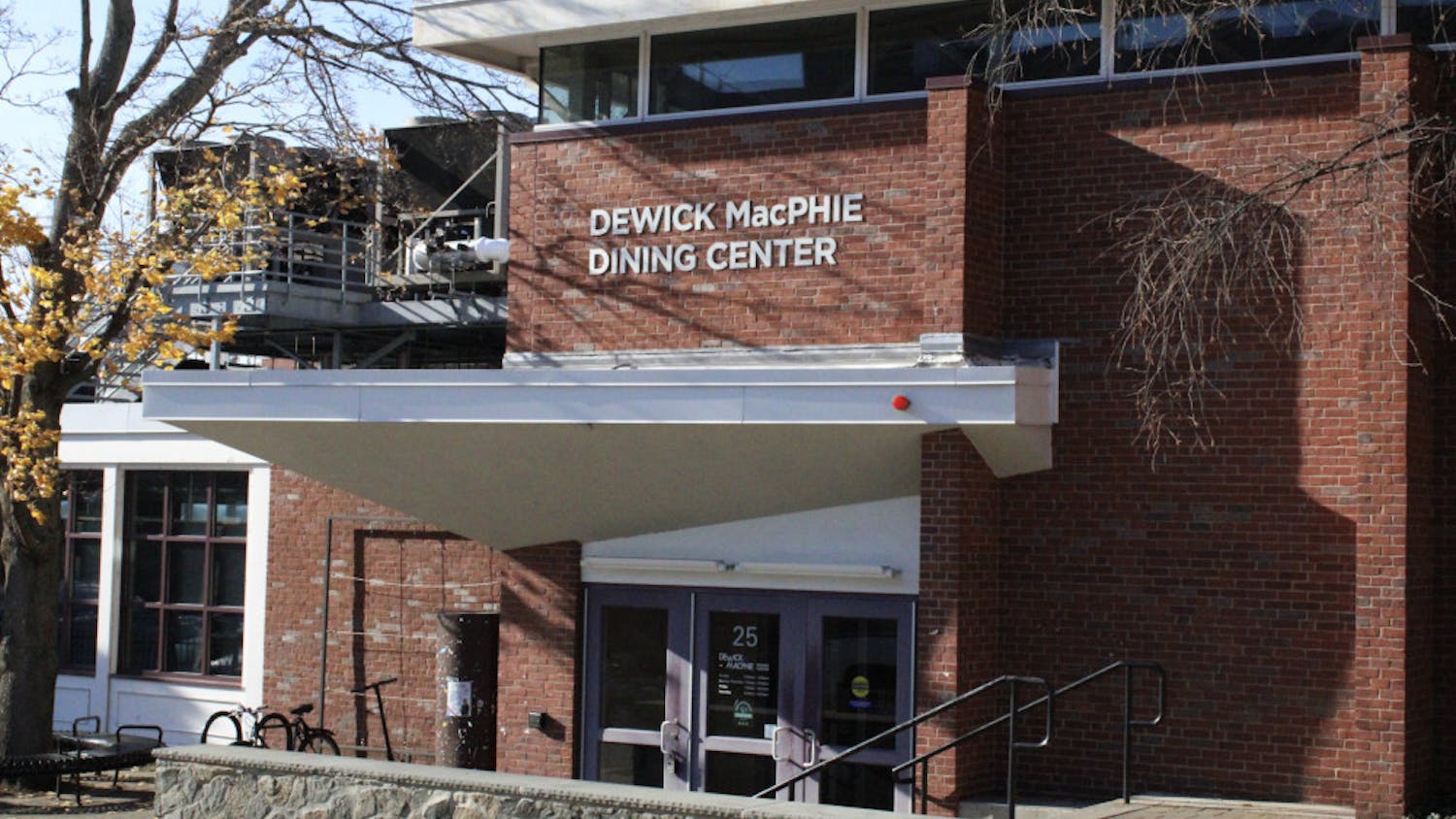As a first-year at Tufts and an international student from Costa Rica, Isaac Rodriguez Zuniga has faced many challenges in college life during the COVID-19 pandemic. With English as his second language, Rodriguez Zuniga often encounters language barriers in class; the muffling effect of masks and Zoom lectures with over 200 participants do not make things easier.
“I still have a really big … language gap,” Rodriguez Zuniga said. “I can get lost pretty easily [over] just one word that I have never heard before.”
In his in-person class, Rodriguez Zuniga worries that it is difficult for his classmates to understand his accent, especially when he is wearing a mask. Rodriguez Zuniga reported that Zoom’s subtitle function makes it easier to understand others in his online courses, but he still found it difficult to acquaint himself with his professor and his classmates or get sufficient help in his large physics class.
“Sometimes Ihave a really good idea, but I don’t know how to develop it or how to show it … so I [end] up just saying, ‘yeah, I agree,’” Rodriguez Zuniga said about his class discussions.
Working overtime in his physics course and having no time for any extracurricular activities, Rodriguez Zuniga still could not make up the 54% on his first exam and chose to apply the exceptional pass/fail policy for the class.
“The policy is … like a stress relief,” Rodriguez Zuniga said.
Rodriguez Zuniga is one of many beneficiaries of this new grading policy that Tufts has enacted since the virus outbreak in March 2020. According to Grant Gebetsberger, the vice president of Tufts Community Union Senate, the blueprint of this policy started after students were sent home. Several students created an online petition to introduce a modified grading policy, and it quickly disseminated on social media.
“It was really a grassroots effort,” Gebetsberger, a senior, said.
According to Anne Mahoney, a senior lecturer in the Department of Classical Studies and chair of the Educational Policy Committee, the EP/F proposal was brought forward by Dean Carmen Lowe to the committee, which consists of both students and faculty.
At the time, the newly elected TCU Senate President, Sarah Wiener, met with academic deans to inform them of the student body’s will. The Educational Policy Committee presented the policy to the faculty for a vote, and according to Wiener, it passed by a landslide.
There was some debate among both students and professors on whether adopting a universal pass/fail policy would be more equitable. However, according to Wiener, most faculty members favored the exceptional version.
“It should be a choice of the students. The students who I work with, the students who contacted me, [and] a lot of my advisees felt that it was in their best interest to have the pass/fail as something that was a choice rather than mandated … so I advocated for that position,” David Proctor, senior lecturer in the Department of History, said.
When it came to deciding whether to continue the policy for fall 2020, the TCU Senate strived to represent students’ voices, according to Wiener. The Senate sent out the Fall 2020 Student Survey consisting of 86 questions last summer. The survey results indicated that students faced unprecedented emotional and financial challenges due to the COVID-19 pandemic and that the EP/F policy was helpful for their academics. According to a report shared with the Daily, over 93% of students who responded to the survey were in favor of continuing the exceptional pass/fail policy or implementing a universal one.
Senior Jillian Impastato, an art history and education major, wrote in an email to the Daily that she thinks the EP/F policy is “super important.” Although she has not used it herself, she said she heard firsthand from her friends that the policy "made last semester livable."
Both Wiener and Gebetsberger are also advocates for the policy.
“I think it's kind of outrageous that we are in school right now to begin with. There's so much on people’s plates … to have the same expectations that we would in a normal world is kind of futile,” Wiener said.
According to Gebetsberger, EP/F helps to alleviate some of the equity concerns posed by the pandemic by offering extra breathing room for students disproportionately affected.
“You're talking about students who are primary caregivers for parents and siblings. And you're also talking about students who have parents and loved ones who are essential workers … and we know COVID disproportionately impacts Black communities and other communities of color in the United States,” Gebetsberger said.
According to Dean of Undergraduate Studies Carmen Lowe and Dean of Academic Advising and Undergraduate Studies Jennifer Stephan, the main reasons behind continuing the EP/F policy in the fall were the concerns over the general pandemic impact, time zone differences of virtual students and “the worsening of inequities in the way in which the pandemic is disproportionally impacting some populations,” they wrote in an email to the Daily.
Faculty members voted to extend EP/F into the spring 2021 semester, but concerns about the policy are rising among them, Mahoney said.
According to Deans Lowe and Stephan, there is concern that the policy could lead students to slack off in their academic attendance and effort. They said students could use the policy to max out their GPAs, which could cause repercussions in applying to graduate schools or internships.
Mahoney said in an email to the Daily that many faculty members heard from students saying that they would choose the policy if they likely would not get an A. “We found this distasteful, though we can see why students would want to do this,” Mahoney said.
Mahoney believes that EP/F sends a wrong message that faculty members do not believe Tufts students can handle challenges and the essential result of courses is a grade. “Students do of course need support … but they need support that’s relevant to the actual problems they face, not just to manipulating their GPAs,” Mahoney said.
According to Mahoney and Deans Lowe and Stephan, the faculty do not expect that they will use EP/F again after spring 2021.
However, Senior Lecturer and Co-Director of Educational Studies Erin Seaton understands but dismissed these concerns. Seaton is an active member of Tufts Action Group, a faculty organization at Tufts that advocates for progressive policies and focuses on marginalized student groups.
“I really don't think that there were students who use this as a way to boost their GPA or take more classes," Seaton said. "I think the students that put this into place were really struggling … and [the policy] gave them a way to take a course without the stress and the anxiety of getting a grade,”
Seaton collected 20 to 30 stories from her students about how they benefited from EP/F.
“That's a powerful reason to take an exceptional pass/fail that ‘my dad lost his job, and now I'm working full time and I didn't expect to be working full time and a student,’” Seaton said.
Moreover, student leaders like Gebetsberger also believe that GPA manipulation is not the case for most of the students. “Even if it were [the case], it's so much more important that we support students who need support, than preventing students from having a slightly higher GPA,” Gebetsberger said.
According to Deans Lowe and Stephan, the majority of students in fall 2020 took letter grades for all their classes, and those who opted for EP/F grading overwhelmingly took it for just one class.
Despite the opposing positions, school members from both sides agree that EP/F is a valuable opportunity for the Tufts community to re-evaluate the effectiveness of the grading system.
Wiener thinks the policy has introduced deeper conversations about academic equity. “What do we want students to be learning? And are we measuring that in a way that is equitable to students that are historically and repeatedly institutionally disadvantaged?” Wiener said.
Impastato echoed Wiener's stance.
“There is no even playing field. [EP/F grading] is what is needed at the current moment, but we must come together to find a better, more sustainable solution,” Impastato said.
Mahoney said she recognizes the issues with the common grading policy. She said that a subgroup of the Educational Policy Committee, of which she is a part, found that Black and Latinx students systematically get lower grades than white and Asian students at Tufts.
"If there is a systematic discrepancy in the grades we give, this is a problem,” Mahoney said.
According to Mahoney, the Educational Policy Committee is currently working with student representatives to come up with potential changes to the broad grading policy and may implement them in fall 2022.
According to Seaton, the positive thing about EP/F is that faculty has been talking more about the pressure students face but she urges for a deeper discussion.
“[It is] very challenging to do something radical like take grades away, but there needs to be more conversations about what grades mean,” Seaton said.
Rodriguez Zuniga said he is grateful that EP/F grading is extended for spring 2021. He will take French this semester, which he said is a completely new territory for him. Rodriguez Zuniga said EP/F will enable him to keep learning and not have to drop the class because of low grades.
"I know that it will be different if our classes go back in person, but I feel like this policy … even in person … it's something that I [would] take advantage [of]," Rodriguez Zuniga said.






